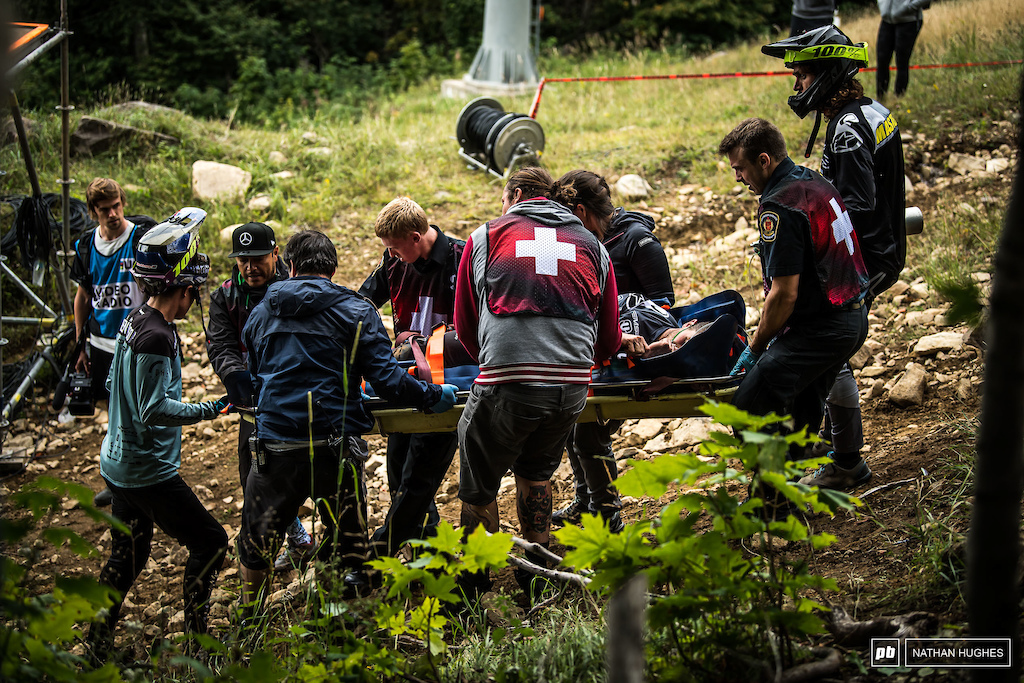UCI Plans Much Faster Evacuations in Case of Serious Injury at Downhill World Championships
Following Brook Macdonald's 5 hour ordeal on the slopes of Mont Sainte Anne last year, the UCI has published the medical procedures for evacuation in case of another bad injury in the downhill World Championships this weekend. Thankfully it seems that Leogang is much better prepared for a serious incident and the UCI is expecting much faster evacuation times this year
A contributing factor to Brook's delayed evacuation from the mountain was that it was difficult to access the track with a helicopter. Leogang should be far more prepared than Mont Sainte Anne with 3 helipads on the mountainside within easy reach of the track. The UCI also claims that 85% of the Leogang track is directly accessible via a forest path and the final 15%, which seems to be the new fresh-cut section in the steep woods, apparently has had three rescue routes dug in to help get riders out, all of which should help in case of a helicopter evacuation.
Alongside the improved helicopter access, there will also be a large number of medical staff lining the track including 32 marshalls, six paramedics, four mountain rescuers, two ambulances and an emergency doctor. All this combined should allow a rider to get medical attention much quicker than in Mont Sainte Anne.
The UCI claims that a marshall will be at the scene of an accident within an average of 30 seconds and a paramedic and mountain rescuer will be on the scene within an average of 3 minutes. This is a minute quicker than in Brook's injury, where the UCI confirmed it took 4 minutes for a first aider to arrive. The UCI said, "first aiders were on the scene within four minutes to stabilise Brook’s spinal column, place him in a secure position, and carry out an initial assessment that determined he was suffering severe pain in the lower back and pelvic regions, hyperesthesia in one lower extremity and altered motor function in the other." That minute might not sound like much but in serious incidents, every second is crucial.
Following the first aid, the UCI is expecting the emergency doctor and an operations manager to be on the scene within 8 minutes on average in Leogang. This is about a quarter of the time is took them to arrive during Brook's injury, where the UCI said: "The first doctor was on the scene within 30 minutes with all the necessary heart monitoring equipment and sedatives. From that point on, the victim’s spinal column was perfectly stabilised, his vital signs and blood oxygen levels monitored, and morphine administered."
With three helipads, the UCI expects a helicopter to be at the place of operation anywhere from 6-12 minutes, depending on which helipad is used. This again is much faster than in Brook's case, where it took a number of hours. The flight time from the nearby helipad to the hospital is claimed to be 5 minutes or, if an ambulance is sufficient, the journey will take 16 minutes.
We commend the UCI and local organisers for being much more prepared for a serious injury at this year's World Champs and hope that its rescue plan won't have to be put into practice this year.
The full Rescue Plan can be found below:
Press Release: UCI
Medical care resources along the route
- 32 Marshalls
- 4 Paramedics
- 4 Mountain rescuers
- 4 Staff of the biker rescue service
- 1 Operations manager = emergency paramedic
- 1 Emergency doctor
- 3 equipped helicopter landing pads
- 2 Ambulance vehicles
- 1 Quad of biker rescue
- Direct radio connection to the state control centre Rotes Kreuz Salzburg
Additionally: 1 paramedic in the finish and 1 additional paramedic on call in the finish area
Special material equipment for medical care
Mountain Rescue Service:
4 UT-2000 (Special stretcher for terrain)
Vacuum mattress and rescue sheet for direct transfer to the rescue helicopter
Emergency doctor:
Medumat for possible ventilation of patients requiring intensive care
LP15 – EKG for monitoring/ reanimation
Various emergency medicines
suction unit
Paramedic:
Every paramedic always has digital radios - permanent radio connection
HWS- Immobilization collar
Ambulance backpack for medical care of the injured person
Vacuum mattress and scoop stretcher, rescue sheet for removal/transfer
Operating times (average):
Marshall to Injured person - 30sec. to the radio message
Paramedic to Injured person - 3 min
Mountain rescuers to Injured person - 3 min
Operations manager to Injured person - 8 min
Emergency doctor to Injured person - 8 min
Rescue helicopter to Place of operation from 6 to 12 minutes
Transportation:
Rescue helicopter to Hospital 5 min
Ambulance vehicle to Hospital 16 min
(Krankenhaus – Tauernklinikum Zell am See; Medical practitioner Dr. Rainer 5 min)
Procedure of an operation:
1. marshall radios to head of operations
2. operations manager sends mountain rescue and paramedics to the
casualty/Marshall, at the same time emergency doctor on the way to the casualty
3. primary care by paramedics
4. rescue by the mountain rescue service and biker rescue / supply by paramedics - if
necessary parallel alerting of emergency helicopter
5. in the case of seriously injured persons, the emergency doctor and head of
operations are immediately called in
6. direct rope rescue by the rescue helicopter if necessary
7. rescue to the transfer point to the Red Cross vehicle
8. transport by ambulance or rescue helicopter to the hospital
Additional information:
85% of the trail are directly accessible via a forest path. Along the last 15% of the trail there are a total of 3 rescue routes, so that an injured person can leave the steep forest terrain as quickly as possible. Mountain rescuers and paramedics are positioned directly along the route (key points); minor injuries (abrasions, ...) are treated by the paramedic/doctor in the first aid room directly at the valley station.
Author Info:
Must Read This Week
Sign Up for the Pinkbike Newsletter - All the Biggest, Most Interesting Stories in your Inbox
PB Newsletter Signup



There seemed to be stuff going on at MSA about legal liability and cost that meant the safety provision was compromised.
Hopefully nobody will need any help after a crash this weekend.
Both these methods are quick and safe, we usually get injured people in the clinic at the bottom of the hill within 15 minutes from the moment we get the call. From there, if needed, it’s a 5 minutes ambulance drive to the hospital. So there is no real need for a risky and expensive heli evac.
Summer is different though. They are simply not set up for proper evac coverage and I guess the owner (Resort of the Canadian Rockies, who owns a number of large resorts across Canada) is not willing to invest for proper summer evac setup as there are little business going on on summer. Always a money thing..
Also I think that the UCI is part of the problem right now. While they ask for large sums of money to the organiser to hold the event, it’s very difficult for the organiser to generate money from mtb racing events. So how could you expect the organiser to be able to pay for a standby evac helicopter? It’s easy for the UCI to make a statement like they just did today that evac procedures will be improved. But they will have to walk the talk and find a way to keep the events viable while investing more money for emergency procedures. Especially for the venues that are not already setup for heli evac.
"hey guys, i messed up, it won't happen again. We should all learn from my mistake so we don't do it again and we can all continue to benefit"
You cannot compare Austria to Canada, apples and oranges.
Zero mention whatsoever of alternatives to landing the helicotper, like hoist or longline rescue, which don’t require a helipad. This article is written by someone who doesn’t understand what challenges Brook faced and why.
Totally unacceptable, and totally preventable. I feel for Brook.
First aid is basically stopping severe bleeding, stopping the person from moving and keeping them calm while you wait for help. Every person over the age of 10 active in any sport or outdoor activity should have basic first aid knowledge/training. A one day class should easily cover more than I think a Marshall would ever need to know, considering they do have medical support.